Prince Andrew is currently engaged in discussions with representatives of King Charles III regarding his potential departure from the Royal Lodge, his 30-room residence located in Windsor. According to London’s The Telegraph, Buckingham Palace is increasing its efforts to persuade the Prince to vacate the property, although he cannot be legally evicted due to the terms of his “cast iron” lease.
The ongoing negotiations follow a public outcry concerning reports that Prince Andrew has been living at the Royal Lodge rent-free. These discussions have taken place daily, reflecting a growing urgency to resolve the situation, which has drawn significant negative publicity. Initially, Prince Andrew resisted the notion of leaving, citing that he has 50 years remaining on his pre-paid lease. Despite this, there seems to be a shifting sentiment that a move may become inevitable.
The primary concerns now revolve around where Prince Andrew would reside next and what financial compensation he might receive for the substantial investments he has made in the property, which is leased from the Crown Estate. Royal sources indicate a revitalized determination within the Palace to facilitate Andrew’s departure, while also ensuring that his daughters, Princesses Beatrice and Eugenie, feel secure about their residences in St James’s Palace and Kensington Palace.
Discussions about Prince Andrew’s living arrangements have intensified as the Royal Lodge’s association with negative press continues to grow. Earlier hopes for a swift resolution have been complicated by the difficulty of reaching a consensus that satisfies all involved parties. King Charles had anticipated that by urging his brother to relinquish his Duke of York title and other honors, the controversies surrounding Andrew’s associations—particularly with convicted sex offender Jeffrey Epstein—would diminish. However, this has not transpired.
The Palace is keen to avoid a prolonged parliamentary inquiry into royal finances, which has added urgency to the discussions regarding Andrew’s accommodation. A potential solution could involve relocating him to one of the King’s privately owned properties, such as Sandringham or Balmoral. These estates feature self-contained homes that would allow him to live rent-free, thereby alleviating concerns over public expenditure.
Despite this option, Prince Andrew reportedly prefers to remain in London or Windsor, close to his daughters. Options for relocating him to a smaller property on the Windsor estate could mitigate public backlash regarding his living conditions. However, such a move would require him to pay rent, which may not be financially viable. Housing him at Windsor Castle or Buckingham Palace could also lead to accusations of preferential treatment, further complicating the situation.
Another aspect of the negotiations involves the future of the Royal Lodge itself. Given its proximity to Windsor Castle, renting it out privately presents significant challenges. Under the lease signed in 2003, Prince Andrew is entitled to a partial refund on a £1 million upfront payment, along with over £7.5 million spent on refurbishments. If he vacates before June 2024, he stands to receive £557,596. This amount will decrease annually until it becomes null in 2028.
Prince Andrew has maintained that abandoning the Royal Lodge, which he has invested approximately £10 million in, would be illogical given his ongoing financial commitments. As a result, he is likely to seek compensation that exceeds the legally owed amount, potentially necessitating funding from the King, as the Crown Estate is accountable to the Treasury, which is unlikely to allocate public funds for this purpose.
The situation is further complicated by the living arrangements of Prince Andrew’s ex-wife, Sarah Ferguson, who also occupies rooms at the Royal Lodge. It remains unclear whether she would accompany him on a move or seek her own accommodations.
Prince William and King Charles have expressed through their representatives that Princesses Beatrice and Eugenie are not implicated in the ongoing controversies. They assured that their residences remain unaffected. In a notable recent development, Prince Andrew’s royal banner was removed from St George’s Chapel at Windsor Castle, following his resignation from the Order of the Garter last week.
As negotiations continue, the outcome remains uncertain, with various stakeholders seeking a resolution that balances personal desires with public expectations.






























































